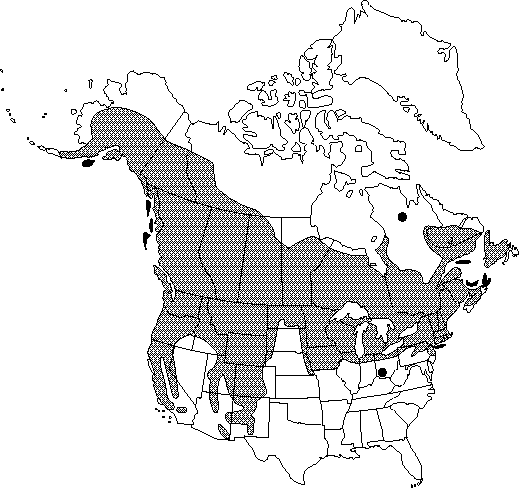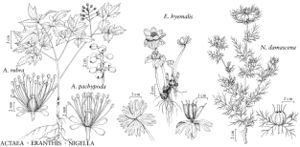Difference between revisions of "Actaea rubra"
Enum. Pl. 1: 561. 1809.
FNA>Volume Importer |
GeoffLevin (talk | contribs) m (Fixed Nfld. and Labr. distribution to match map in printed version.) |
||
| (8 intermediate revisions by 2 users not shown) | |||
| Line 9: | Line 9: | ||
|common_names=Actée rouge | |common_names=Actée rouge | ||
|special_status={{Treatment/ID/Special_status | |special_status={{Treatment/ID/Special_status | ||
| + | |code=W2 | ||
| + | |label= | ||
| + | }}{{Treatment/ID/Special_status | ||
|code=E | |code=E | ||
|label=Endemic | |label=Endemic | ||
}}{{Treatment/ID/Special_status | }}{{Treatment/ID/Special_status | ||
|code=F | |code=F | ||
| − | |label= | + | |label=Illustrated |
| − | |||
| − | |||
| − | |||
}} | }} | ||
| − | |basionyms={{Treatment/ID/ | + | |basionyms={{Treatment/ID/Basionym |
|name=Actaea spicata var. rubra | |name=Actaea spicata var. rubra | ||
|authority=Aiton | |authority=Aiton | ||
| + | |rank=variety | ||
| + | |publication_title=Hort. Kew. | ||
| + | |publication_place=2: 221. 1789 | ||
}} | }} | ||
|synonyms={{Treatment/ID/Synonym | |synonyms={{Treatment/ID/Synonym | ||
|name=Actaea arguta | |name=Actaea arguta | ||
|authority=Nuttall | |authority=Nuttall | ||
| − | }}{{Treatment/ID/Synonym | + | |rank=species |
| + | }} {{Treatment/ID/Synonym | ||
|name=Actaea eburnea | |name=Actaea eburnea | ||
|authority=Rydberg | |authority=Rydberg | ||
| − | }}{{Treatment/ID/Synonym | + | |rank=species |
| + | }} {{Treatment/ID/Synonym | ||
|name=Actaea rubra subsp. arguta | |name=Actaea rubra subsp. arguta | ||
|authority=(Nuttall) Hultén | |authority=(Nuttall) Hultén | ||
| − | }}{{Treatment/ID/Synonym | + | |rank=subspecies |
| + | }} {{Treatment/ID/Synonym | ||
|name=Actaea neglecta | |name=Actaea neglecta | ||
|authority=Greene | |authority=Greene | ||
| − | }}{{Treatment/ID/Synonym | + | |rank=species |
| + | }} {{Treatment/ID/Synonym | ||
|name=Actaea rubra var. dissecta | |name=Actaea rubra var. dissecta | ||
|authority=Britton | |authority=Britton | ||
| − | }}{{Treatment/ID/Synonym | + | |rank=variety |
| + | }} {{Treatment/ID/Synonym | ||
|name=Actaea viridiflora | |name=Actaea viridiflora | ||
| − | |authority= | + | |authority= |
| + | |rank=species | ||
}} | }} | ||
|hierarchy=Ranunculaceae;Actaea;Actaea rubra | |hierarchy=Ranunculaceae;Actaea;Actaea rubra | ||
| Line 48: | Line 57: | ||
}}<!-- | }}<!-- | ||
| − | --><span class="statement" id="st- | + | --><span class="statement" id="st-undefined" data-properties=""><b>Leaf </b>blade: leaflets abaxially glabrous or pubescent. <b>Inflorescences</b> at anthesis often as long as wide, pyramidal. <b>Flowers</b>: petals acute to obtuse at apex; stigma nearly sessile, 0.7-1.2 mm diam. during anthesis, much narrower than ovary. <b>Berries</b> red or white, widely ellipsoid, 5-11 mm; pedicel dull green or brown, slender, 0.3-0.7 mm diam., thinner than axis of raceme. <b>Seeds</b> 2.9-3.6 mm. <b>2n</b> = 16.</span><!-- |
-->{{Treatment/Body | -->{{Treatment/Body | ||
| Line 54: | Line 63: | ||
|habitat=Mostly deciduous forests, also mixed coniferous forests, open pine or spruce woodlands, swales, stream banks, and swamps | |habitat=Mostly deciduous forests, also mixed coniferous forests, open pine or spruce woodlands, swales, stream banks, and swamps | ||
|elevation=0-3500 m | |elevation=0-3500 m | ||
| − | |distribution=Alta.;B.C.;Man.;N.B.;Nfld.;N.W.T.;N.S.;Ont.;P.E.I.;Que.;Sask.;Yukon;Alaska;Ariz.;Calif.;Colo.;Conn.;Idaho;Ill.;Ind.;Iowa;Maine;Mass.;Mich.;Minn.;Mont.;Nebr.;Nev.;N.H.;N.J.;N.Mex.;N.Y.;N.Dak.;Ohio;Oreg.;Pa.;R.I.;S.Dak.;Utah;Vt.;Wash.;Wis.;Wyo. | + | |distribution=Alta.;B.C.;Man.;N.B.;Nfld. and Labr.;N.W.T.;N.S.;Ont.;P.E.I.;Que.;Sask.;Yukon;Alaska;Ariz.;Calif.;Colo.;Conn.;Idaho;Ill.;Ind.;Iowa;Maine;Mass.;Mich.;Minn.;Mont.;Nebr.;Nev.;N.H.;N.J.;N.Mex.;N.Y.;N.Dak.;Ohio;Oreg.;Pa.;R.I.;S.Dak.;Utah;Vt.;Wash.;Wis.;Wyo. |
| − | |discussion=<p>The "eye" formed by the persistent stigma in Actaea rubra is smaller than that in A.pachypoda.</p><!-- | + | |discussion=<p>The "eye" formed by the persistent stigma in <i>Actaea rubra</i> is smaller than that in A.pachypoda.</p><!-- |
| − | --><p>Actaea rubra is part of a circumboreal complex and is very similar to the black-fruited European species A. spicata Linnaeus, with which it is sometimes considered conspecific. The western North American plants of A. rubra have been called A. arguta and were distinguished on the basis of their smaller berries, more pubescent leaves, and narrow, more dissected leaflets. Those distinctions, however, are weak; specimens from the West often have fruits and leaves similar to those of plants from the East. A thorough study of A.spicata in the broad sense, on a worldwide scale, is needed to resolve the delimitation of taxa within this complex.</p><!-- | + | --><p><i>Actaea rubra</i> is part of a circumboreal complex and is very similar to the black-fruited European species <i>A. spicata</i> Linnaeus, with which it is sometimes considered conspecific. The western North American plants of <i>A. rubra</i> have been called A. arguta and were distinguished on the basis of their smaller berries, more pubescent leaves, and narrow, more dissected leaflets. Those distinctions, however, are weak; specimens from the West often have fruits and leaves similar to those of plants from the East. A thorough study of A.spicata in the broad sense, on a worldwide scale, is needed to resolve the delimitation of taxa within this complex.</p><!-- |
| − | --><p>Plants with white fruit, sometimes distinguished as Actaea rubra forma neglecta (Gillman) H. Robinson, are frequent and are more common than the red-fruited form in many localities.</p><!-- | + | --><p>Plants with white fruit, sometimes distinguished as <i>Actaea rubra</i> forma neglecta (Gillman) H. Robinson, are frequent and are more common than the red-fruited form in many localities.</p><!-- |
| − | --><p>Native Americans used various preparations made from the roots of Actaea rubra medicinally to treat coughs and colds, sores, hemorrhages, stomachaches, syphilis, and emaciations; preparations from the entire plant as a purgative; and infusions from the stems to increase milk flow. It was also used in various ceremonies (D. E. Moerman 1986).</p> | + | --><p>Native Americans used various preparations made from the roots of <i>Actaea rubra</i> medicinally to treat coughs and colds, sores, hemorrhages, stomachaches, syphilis, and emaciations; preparations from the entire plant as a purgative; and infusions from the stems to increase milk flow. It was also used in various ceremonies (D. E. Moerman 1986).</p> |
|tables= | |tables= | ||
|references= | |references= | ||
| Line 67: | Line 76: | ||
-->{{#Taxon: | -->{{#Taxon: | ||
name=Actaea rubra | name=Actaea rubra | ||
| − | |||
|authority=(Aiton) Willdenow | |authority=(Aiton) Willdenow | ||
|rank=species | |rank=species | ||
| Line 77: | Line 85: | ||
|habitat=Mostly deciduous forests, also mixed coniferous forests, open pine or spruce woodlands, swales, stream banks, and swamps | |habitat=Mostly deciduous forests, also mixed coniferous forests, open pine or spruce woodlands, swales, stream banks, and swamps | ||
|elevation=0-3500 m | |elevation=0-3500 m | ||
| − | |distribution=Alta.;B.C.;Man.;N.B.;Nfld.;N.W.T.;N.S.;Ont.;P.E.I.;Que.;Sask.;Yukon;Alaska;Ariz.;Calif.;Colo.;Conn.;Idaho;Ill.;Ind.;Iowa;Maine;Mass.;Mich.;Minn.;Mont.;Nebr.;Nev.;N.H.;N.J.;N.Mex.;N.Y.;N.Dak.;Ohio;Oreg.;Pa.;R.I.;S.Dak.;Utah;Vt.;Wash.;Wis.;Wyo. | + | |distribution=Alta.;B.C.;Man.;N.B.;Nfld. and Labr.;N.W.T.;N.S.;Ont.;P.E.I.;Que.;Sask.;Yukon;Alaska;Ariz.;Calif.;Colo.;Conn.;Idaho;Ill.;Ind.;Iowa;Maine;Mass.;Mich.;Minn.;Mont.;Nebr.;Nev.;N.H.;N.J.;N.Mex.;N.Y.;N.Dak.;Ohio;Oreg.;Pa.;R.I.;S.Dak.;Utah;Vt.;Wash.;Wis.;Wyo. |
|reference=None | |reference=None | ||
|publication title=Enum. Pl. | |publication title=Enum. Pl. | ||
|publication year=1809 | |publication year=1809 | ||
| − | |special status=Endemic; | + | |special status=W2;Endemic;Illustrated |
| − | |source xml=https:// | + | |source xml=https://bitbucket.org/aafc-mbb/fna-data-curation/src/2e0870ddd59836b60bcf96646a41e87ea5a5943a/coarse_grained_fna_xml/V3/V3_555.xml |
|genus=Actaea | |genus=Actaea | ||
|species=Actaea rubra | |species=Actaea rubra | ||
| − | |||
| − | |||
| − | |||
| − | |||
| − | |||
| − | |||
| − | |||
| − | |||
| − | |||
| − | |||
| − | |||
| − | |||
| − | |||
| − | |||
| − | |||
| − | |||
}}<!-- | }}<!-- | ||
-->[[Category:Treatment]][[Category:Actaea]] | -->[[Category:Treatment]][[Category:Actaea]] | ||
Latest revision as of 14:50, 29 February 2024
Leaf blade: leaflets abaxially glabrous or pubescent. Inflorescences at anthesis often as long as wide, pyramidal. Flowers: petals acute to obtuse at apex; stigma nearly sessile, 0.7-1.2 mm diam. during anthesis, much narrower than ovary. Berries red or white, widely ellipsoid, 5-11 mm; pedicel dull green or brown, slender, 0.3-0.7 mm diam., thinner than axis of raceme. Seeds 2.9-3.6 mm. 2n = 16.
Phenology: Flowering spring–early summer.
Habitat: Mostly deciduous forests, also mixed coniferous forests, open pine or spruce woodlands, swales, stream banks, and swamps
Elevation: 0-3500 m
Distribution

Alta., B.C., Man., N.B., Nfld. and Labr., N.W.T., N.S., Ont., P.E.I., Que., Sask., Yukon, Alaska, Ariz., Calif., Colo., Conn., Idaho, Ill., Ind., Iowa, Maine, Mass., Mich., Minn., Mont., Nebr., Nev., N.H., N.J., N.Mex., N.Y., N.Dak., Ohio, Oreg., Pa., R.I., S.Dak., Utah, Vt., Wash., Wis., Wyo.
Discussion
The "eye" formed by the persistent stigma in Actaea rubra is smaller than that in A.pachypoda.
Actaea rubra is part of a circumboreal complex and is very similar to the black-fruited European species A. spicata Linnaeus, with which it is sometimes considered conspecific. The western North American plants of A. rubra have been called A. arguta and were distinguished on the basis of their smaller berries, more pubescent leaves, and narrow, more dissected leaflets. Those distinctions, however, are weak; specimens from the West often have fruits and leaves similar to those of plants from the East. A thorough study of A.spicata in the broad sense, on a worldwide scale, is needed to resolve the delimitation of taxa within this complex.
Plants with white fruit, sometimes distinguished as Actaea rubra forma neglecta (Gillman) H. Robinson, are frequent and are more common than the red-fruited form in many localities.
Native Americans used various preparations made from the roots of Actaea rubra medicinally to treat coughs and colds, sores, hemorrhages, stomachaches, syphilis, and emaciations; preparations from the entire plant as a purgative; and infusions from the stems to increase milk flow. It was also used in various ceremonies (D. E. Moerman 1986).
Selected References
None.
